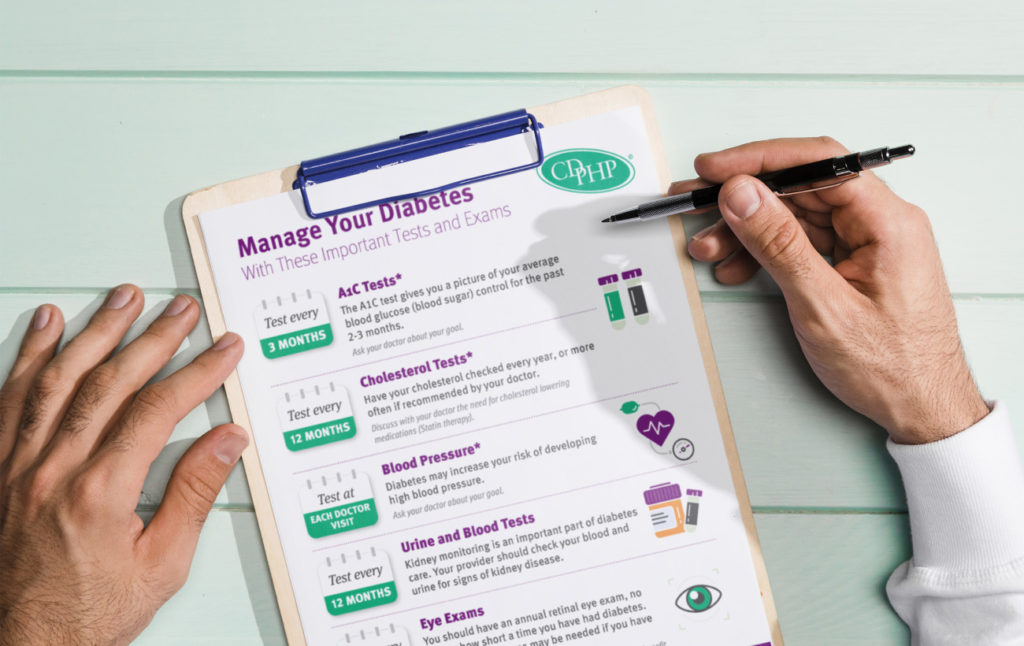Have diabetes? Read these 4 facts about eye care

Staying healthy while living with Type 1 or Type 2 diabetes is no easy feat. Eating a balanced diet, exercising regularly, getting checkups at your doctor’s office, and taking medications as prescribed are just a few tasks on your diabetes health checklist. But don’t forget to add one crucial item to that list: eye care.
Although you may not hear about it as much, when you have Type 1 or Type 2 diabetes, it’s important to pay attention to your eye health because of diabetic retinopathy (die-uh-BET-ik ret-ih-NOP-uh-thee).
Diabetic retinopathy is a diabetes complication that affects eyes. It is caused by damage to the blood vessels of the light-sensitive tissue at the back of the eye (retina). At first, diabetic retinopathy might not cause any symptoms, or only mild vision problems. However, it can eventually cause blindness. The condition can develop in anyone who has Type 1 or Type 2 diabetes. The longer you have diabetes and the less controlled your blood sugar is, the more likely you are to develop this eye complication.
Here are four common myths about diabetes eye care and the facts you need to know:
| FICTION | FACT |
|---|---|
| I don’t have any problems with my eyes. I can see fine. | People with Type 1 or Type 2 diabetes are more at risk for vision changes and diabetic retinopathy. Early detection, even before symptoms develop, reduces your risk of eye disease or blindness. |
| My insurance only covers exams every two years. | People with diabetes should have an eye exam at least once a year. CDPHP® covers diabetes eye exams yearly and as ordered by your physician. |
| It will hurt to have my eyes dilated and examined. | During an eye exam, the eye care provider may use special eye drops to make your pupil bigger and help your provider see the back of your eye. These drops and the eye exam are painless, but your vision will be blurred and your eyes will be sensitive to bright light after the exam. You may need to have someone drive you home. But, depending on the type of eye exam, you may not need your eyes dilated. |
| My blood sugar levels have been under control. I don’t have to worry about any effects from my diabetes. | When your blood sugar is usually in normal range, the onset and progression of retinopathy may be slower, but you still should have your eyes examined every year. |

When you meet with your eye doctor, be sure to ask these questions:
- Do I have diabetic retinopathy? If so, what stage?
- Is there anything I can do to lower my risk of developing retinopathy or slow its progress?
- Do my current blood sugar, blood pressure, and cholesterol numbers meet the levels recommended to lower the risk of eye disease?
- Will you send a letter to the doctor who manages my diabetes? (Note: In most cases, this is your primary care provider)
- When should I return for another eye examination?
Your doctor is the best person to talk with about diabetes care, including how to prevent diabetic retinopathy. The CDPHP Care Team is also here to help. To talk one-on-one with a member of the CDPHP Care Team at no extra cost, simply call toll-free 1-800-365-4180. The team has certified nurses, registered dietitians, and care coordinators available to talk with you about upcoming doctor appointments, medications, diet, or even exercise plans.
 The Daily Dose
The Daily Dose
Comments are closed.